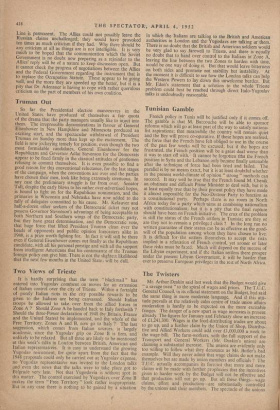Tunisian Gamble
French policy in Tunis will be justified only if it comes off. The gamble is that M. Baccouche will be able to sponsor reforms which will go at least part of the way to satisfy nationa- list aspirations; that meanwhile the country will remain quiet and the Bey will prove co-operative. If these hopes are realised, the force that the French have felt obliged to use in the course of the past few weeks will be excused; but if the hopes are frustrated, the French position will be a great deal worse than it was to start off with. It cannot be forgotten that the French position in Syria and the Lebanon only became finally untenable after the technique of force had been tried and failed. The parallel is by no means exact, but it is at least doubtful whether in the present world-climate of opinion " strong " methods can succeed. It may well be true that the French found M. Chenik an obstinate and difficult Prime Minister to deal with, bnt it is at least equally true that by their present policy they have made it almost impossible for the Neo-Destour Party to function as a constitutional party. Perhaps there is no room in North Africa today for a party which 'aims at combining nationalism with constitutionalism; but it is a pity that the final rupture should have been on French initiative. The crux of the problem is still the status of the French settlers in Tunisia; are /hey or are they not to.remain a privileged class ? In the long run no written guarantee of their status can be as effective as the good- will of the population among whom they have chosen 'to live. It is difficult for the settlers themselves to accept the risks implied in a relaxation of French control, yet sooner or later these risks must be faced. Much will depend on the success of the Libyan experiment, and if the Italian settlers there prosper under the present Libyan Government, it will be harder than ever to preserve European privileges in the rest of North Africa.


























































 Previous page
Previous page